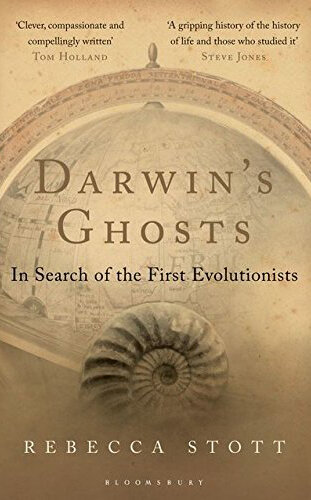Darwin’s Ghosts: In Search of the First Evolutionists
A NEW YORK TIMES NOTABLE BOOK
Christmas, 1859. Just one month after the publication of On the Origin of Species, Darwin received a letter that deeply unsettled him.
He had expected criticism. Letters were arriving every day like swarms, some expressing praise, most outrage and accusations of heresy. But the letter from the Reverend Powell was different. It accused Darwin of failing to acknowledge his predecessors, of having taken credit for a theory that had already been discovered by others, Baden Powell himself and Darwin's own grandfather among them.
For all the excuses that leapt to mind - publication had been rushed; he hadn't been well - Darwin knew he had made a grave error in omitting to mention his intellectual forebears. Yet when he tried to trace these natural philosophers, he found that history had already forgotten them...
In Darwin's Ghosts, historian and novelist Rebecca Stott rediscovers Aristotle walking the shores of Lesbos with his pupils and Leonardo da Vinci searching for fossils in the mine shafts of the Tuscan hills; Diderot, in Paris, under the surveillance of the secret police, exploring the origins of species, and the brilliant naturalists of the Jardin de Plantes first recognising proof of evolutionary change in the natural history collections stolen during the Napoleonic wars.
Darwin's Ghosts is a masterful retelling of the collective daring of a few like-minded men who had the imagination to speculate on nature's ways and the courage to publish at a time when to do so, for political as well as religious reasons, was to risk everything. More than a tale of mummified birds, inland lagoons, Bedouin nomads, secret police files, microscopes and curiosity cabinets, Darwin's Ghosts is the story of an idea that would change the modern world.
Praise for Darwin’s Ghosts
‘Riveting ... told with style and historical nous ... Stott has done a wonderful job in showing just how many extraordinary people had speculated on where we came from before the great theorist dispelled any doubts.’
- Richard Fortey, The Guardian
‘Charles Darwin provided the mechanism for the evolution of the exquisite adaptations found in plants and animals but the awareness that species can change had been growing long before him. With wonderful clarity Rebecca Stott traces how ideas about biological evolution themselves evolved in the minds of great biologists from Aristotle onwards. Darwin would have loved this brilliant book - and so do I'.
- Sir Patrick Bateson, President of the Zoological Society of London
‘Mesmerising, colourful and often moving ... a richly drawn exploration of the key figures on Darwin's list ... this many threaded story of intellectual development is hypnotic. The subject is science, but Stott has a novelist's confidence ... this is a sympathetic examination of the innate human qualities of curiosity and inquiry.’
– Daily Telegraph
‘From Aristotle onwards, evolutionists have - thank God - always been a quarrelsome lot; and not much has changed. Rebecca Stott shows how dispute, prejudice and rage have accompanied their science from the very beginning. Darwin's Ghosts is a gripping history of the history of life and of those who have studied it, with plenty of lessons for today - perhaps for today's biologists most of all.’
- Steve Jones
‘A masterful retelling of the collective daring of a few like-minded men who had the courage to publish their speculations at a time when to do so, for political as well as religious reasons, was to risk everything. It is the story of an idea that would change the modern world.’
- Observer
‘Clever, compassionate and compellingly written, Stott has interwoven history and science to enchanting effect. The evolution of the theory of evolution is a brilliant idea for a book, and she has realised it wonderfully.’
– Tom Holland
‘Absorbing.’
– New York Times Book Review
‘A masterful retelling.’
– Observer
‘Gripping and ambitious.’
– Sunday Times
‘Wonderful.’
– Nature
‘Beautifully written.'
– Independent on Sunday
‘A lively, original book.’
– International Herald Tribune
'A fascinating history.'
– Ziauddin Sardar
'Richly described.'
– Wall Street Journal
Behind the book: Darwin’s Ghosts
An interview with Foyles Bookstore
Dustin Thomason interviews Rebecca for the LibraryThing blog

